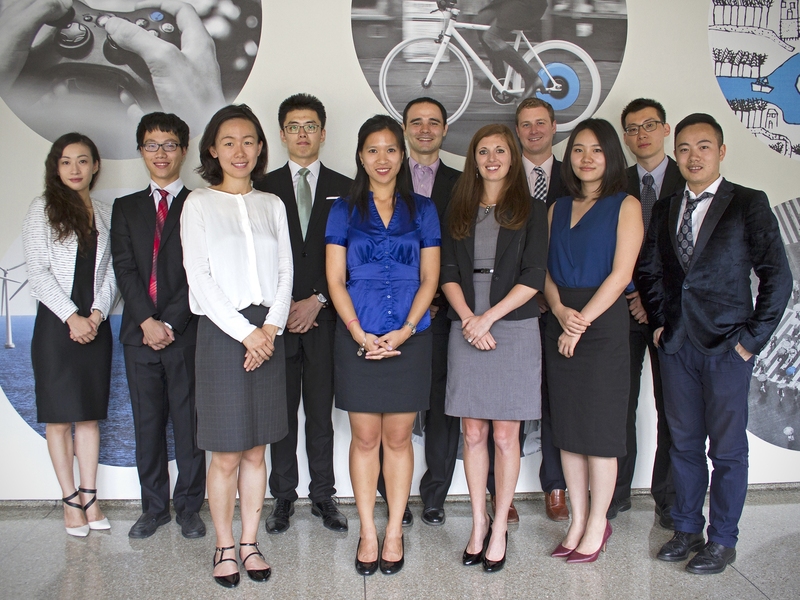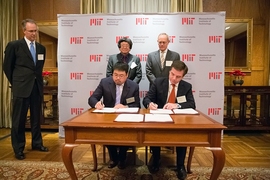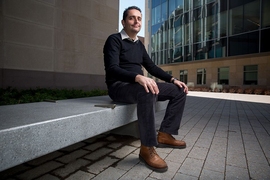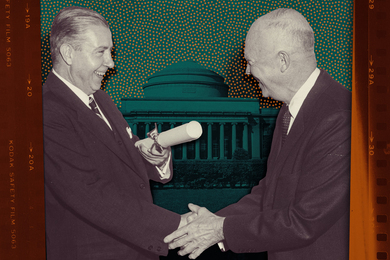The MIT Department of Urban Studies (DUSP), Center for Real Estate (CRE), and the Samuel Tak Lee MIT Real Estate Entrepreneurship Lab (STL Lab) have announced the inaugural class of STL Fellows, welcoming 12 master's students to MIT to study socially responsible real estate development and global urbanization.
Half of the fellows will study in the Master in City Planning (MCP) program in DUSP, and half are Master of Science in Real Estate Development (MSRED) students and will join the newly launched STL Lab, which is administered by CRE and DUSP.
The MCP program provides graduate professional education for persons who will assume planning roles in public, private, and nonprofit agencies, firms, and international institutions, in the United States and abroad. MCP graduates work in a broad array of roles, from traditional city planning to economic, social, and environmental planning. In addition to its core requirements, the program offers four areas of specialization: city design and development; environmental policy and planning; housing, community, and economic development; and international development.
The MSRED is a concentrated, science-and-technology based graduate degree in real estate. Launched in 1983 by the CRE, the MSRED is the first one-year degree of its kind, fulfilling a need for specialized education beyond the scope of the traditional MBA. The MSRED prepares students to compete in the global market with the research-based expertise necessary to solve complex problems in contemporary real estate.
The STL Lab and the fellowships are named after Samuel Tak Lee ’62, SM ’64, an alumnus and global real estate developer whose historic gift to MIT in January 2015 established the STL Lab to promote social responsibility among entrepreneurs and thought leaders in the real estate profession worldwide, with a particular focus on China.
The lab also aims to tap the transformative power of real estate to shape the built environment. Some of the topics and projects that the lab will focus on include: development and urbanization through private action and entrepreneurship; urban resilience and adaptation; land-use reform regulations and codes; new construction materials; data and technology; affordable housing; and environmental aspects of urban growth and development.
The members of the first class of STL Fellows are:
DUSP Students (MCP Program)
Karmen Cheung: As an undergraduate at Yale University, Cheung studied environmental science and worked at an environmental consulting firm based in Boston. At MIT, she hopes to better understand the strategies through which greater affordable housing options can be developed for disadvantaged communities in the United States and the potential applications of these strategies to China.
Jintai Li: Li studied architecture at Tsinghua University in China. At MIT, he hopes to explore how technologies can change the way planners and developers perceive and engage with urban spaces, especially in terms of publicity and accessibility. He is equally interested in small-scale, mixed-use development in and on the brinks of the “historical” zones in Chinese cities, and has been involved in such design practices in Beijing and Guangzhou.
Yifei Lu: Lu is a Master of City Planning student in the City Design and Development group. Before coming to MIT, he studied architecture at Carnegie Mellon University and worked as an architectural designer for four years. Currently, he is interested in affordable housing in the United States and elsewhere, as well as climate change adaptation and resiliency of coastal megacities.
Waishan Qiu: Qiu studied urban planning at Tongji University in China and urban design at University College London in the United Kingdom. Focusing on the interaction of computation, information, and urbanism, Waishan wants to deploy open source information and real-time data to examine the mechanism for showing how investment flows couple with the materialized urban structure.
David Chin-Fei Wang: Wang is a graduate of Pomona College and a U.S. Fulbright Scholar. He researches the cultural meaning of mobility in urban China and how it might be understood to create more livable cities. Most recently David founded the Bamboo Bicycles Beijing, a social enterprise building a community of Beijing residents who design and build their own bicycles out of bamboo.
Wangke Wu: Wangke Wu holds a bachelor's degree from Peking University. He studies eminent domain in China, affordable housing for migrants, and China’s industrial land and rural land markets. His research considers land reform as a way to relieve high home prices in China's big cities, where owning a home is often unattainable, and to help policy makers understand and find solutions for rising land prices.
CRE Students (MSRED Program / STL Lab)
Saurabh Jalori: Jalori studied architecture in India and building science at Arizona State University. He is interested in architectural design, building science, and real estate development. Rooted in his belief in the important role played by real estate developers in shaping the nature and future of cities, he intends to work on the development of high-performance, sustainable built environments.
Dandi Li: Born in China and raised in Finland, Li studied at the Ecole hôtelière de Lausanne, Switzerland, and worked in the development field for international hotel chains. With China’s increasing demand for senior care, Li is interested in exploring retirement housing options and public and private sector involvement strategies for the development of affordable retirement communities.
Stacey Spurr: Spurr studied finance and economics at Lehigh University. She has worked for two large real estate investment organizations overseeing portfolios of office and industrial properties. Spurr seeks to develop creative, sustainable solutions to the natural tensions that exist between owners, tenants, and the broader urban community.
Kevin Murphy: Murphy studied real estate and entrepreneurship at the University of South Carolina. His focus is sustainable growth and development in underserved areas of the world and exploring ways to make urban planning, development initiatives, and smart growth techniques and technologies accessible to a wider audience.
Qing Wang: After graduating from Tsinghua University, Wang spent six years focused on business development and foreign investment in real estate in China. At the STL Lab, Qing plans to study innovative business models and government policy for the Chinese real estate industry, as well as integrating global practices of smart growth in China to develop a sustainable future.
Wensi Zhai: After studying architecture and urban planning and design at Tsinghua University in China, Zhai worked in the real estate industry for five years. Zhai plans to research sustainable real estate development with a focus on physical space, the creation of lifestyle and social relationships, and the establishment of innovative business models to developing high-quality urban communities.








